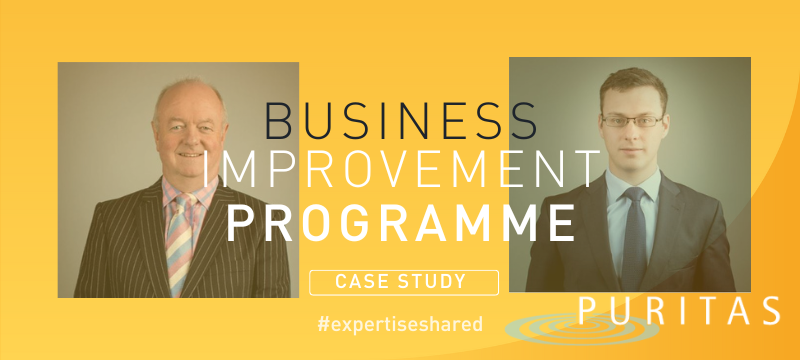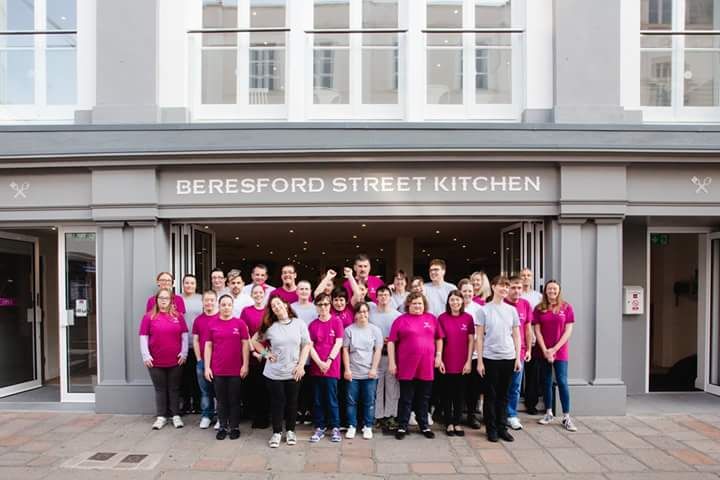Overview
As a digital business Puritas are constantly updating the technology they use in order to better serve their clients, but they recognised that it was also important to look at their own business and see if there were any improvements they could make in how they work. Three members of the Puritas team undertook the Business Improvement Programme, it’s resulted in an estimated £100,000 of savings for the company. Managing Director, Trevor Cole, and Developer, James Walwyn, share their journey.

Why did you take the Business Improvement programme?
Trevor: ‘In 2019 I embarked on getting BSI ISO9001 for Puritas, which is a set of quality management systems standards. That put business improvement and continual improvement into our DNA. We supported one of our developers, James Walwyn, to undertake a Chartered Management Institute level 5 qualification, and it was while studying for that he heard about the Business Improvement Programme. It was important for us that it wasn’t just about being accredited or learning the theory of business improvement, it was about putting it into practice. The course is moderately priced, and you get to work on your own live project, so it was a no-brainer.’
What were your expectations?
"You might say, well you’re a tech company you should be up with the latest trends – but you can’t put a date on common sense. Lots of things can be brought forward and adapted into our modern world."
Trevor: Brian Butler is a very charismatic deliverer of the course and understanding that he’d come from industry and not from Jersey and that he’s worked with lots of other organisations, I had fairly high expectations that it would be a quality course. We went back to some pretty fundamental old teachings, like the Japanese Kaizen and the evolution of business improvement. So, we started off learning all the history and getting stable building blocks. You might say, well you’re a tech company you should be up with the latest trends – but you can’t put a date on common sense. Lots of things can be brought forward and adapted into our modern world.’
James: ‘I’m on the ground, doing the day-to-day work so I’m already trying to figure out ways of eliminating waste and making processes more efficient. I thought that even if we can take back just one key thing from it then that would have been beneficial, but we’ve taken a lot more than that.’
Was it easy to do while still running your business?
"You will always get resistance to change no matter where you are and what you’re doing, and for good reason."
Trevor: ‘Jersey Business don’t run it like a week and you’re done. Brian takes four sessions and in between he came out to our business and helped us apply the tools and learnings and challenge what we were currently doing. It’s very good that you do a bit of the course, come back to work, understand applying it in your own office and have the time to implement what you’ve learned.’
James: ‘Most of the course is you implementing benefits to your company, even though you’ve got four days out the office that’s not a lot spread out over several months. You are immediately applying what you are learning so you easily make up those four days in just what you’re implementing. You will always get resistance to change no matter where you are and what you’re doing, and for good reason. You want people to be able to challenge certain aspects because it allows you to consider the greater impact of what’s happening. If we’re doing a process a certain way, and we’re getting the job done, what will happen if we change it?’
What did you learn?
Trevor: ‘You can sometimes do courses and feel they’re not appropriate to our size or type of organisation because we don’t fit into a typical box because we’re not a manufacturing business as such, and normally companies would have a lot more customers than we have. We’re in it for the long game and it’s about doing ongoing business with them. But it did feel very valuable to us and very relevant. In the practical session, it was very surprising to see the amazing throughput and increases in productivity by making just some changes, and you wouldn’t have thought it would.’
James: ‘If it was just an information course we wouldn’t have realised the benefits but it’s the practice that meant you got involved and implemented it. We support our clients and make their lives easier, why not make our lives easier as well? I also got quite a lot of insight from another digital company I was on the cohort with. They started using templates for their client onboarding, and so we learned from that for our Business Requirements Document which we use at the start of projects. There was also a lawyer whose business is just her. You wouldn’t think that one person would benefit that much, but she was able to make some significant time and money savings. Just one simple improvement can turn into a significant saving over the long term.’
"By looking at all our processes, it helped us streamline a very significant element, which has not only meant we have saved around £100,000 and valuable work time, but also enabled us do some extra work with a client that wouldn’t have been possible before because of the time we were losing."
What has it meant for your business?
James: ‘For years, we knew that our build process, which is how we deliver the software to our clients, had been working but wasn’t efficient. We spent three days doing a client build because that was just the way we did it, but you have got to ask why are we doing it this way? In a day-to-day task that’s so easy to overlook. Since doing the course we’ve implemented build automation that has cut that process down from days to hours. In the last two days we’ve done three builds and before it would take three days to do one build which is not really money generating. We can also now use the time to do more testing as well which means we have less issues, it’s a compound benefit. It’s game changing.’
Trevor: ‘It’s helped reinforce our continual improvement. By looking at all our processes, it helped us streamline a very significant element, which has not only meant we have saved around £100,000 and valuable work time, but also enabled us do some extra work with a client that wouldn’t have been possible before because of the time we were losing. It was also a massive surprise and benefit to get the Six Sigma accreditation and we’re continuing this journey.’
Advice to any other businesses?
Trevor: ‘It’s not a massive amount of time out the business. Sometimes you’re too busy to stop and take a look at things, but anything in life can be improved if you take a moment to reflect. Brian and the course enabled us to do that and save a significant amount of time and money. Every one of us can make improvements, no business is 100% waste free, you can always tweak. It’s a constant process.’
James: ‘We could have got a consultant in to advise us, but by doing this ourselves, we have learned how to look at our processes and get things done that will stay done, and also keep improving. Everything can be adapted to your own industry. You don’t do the course and then stop. If people think there is no room for improvement, then they’re probably the ones who are most in need. I would ask, when did you last look at your processes? Jersey Business also offer continued support like the Productivity Circle, which is a free networking forum where you get to continue learning from experts and other businesses.’
Puritas is a software house, providing fund administration, fund management, and client data management solutions to finance companies.
Jersey Business run the Business Improvement Programme twice a year. The next course begins in February 2024. The Productivity Circle, run bimonthly, is a free development and networking forum for any individuals interested in continuous business improvement in their organisations. For further details contact events@jerseybusiness.je.

